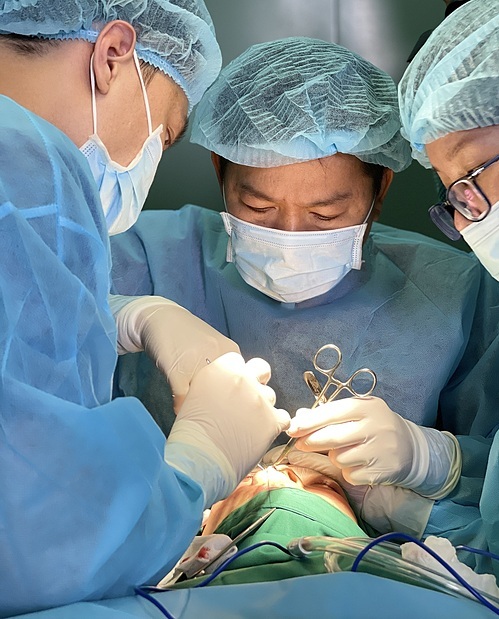Ho Chi Minh City, 21-year-old girl, has a tumor compressing her nostril, 3 failed surgeries, causing facial deformity, blocking one side of her nose so she has to breathe through her mouth.
The tumor appeared on the right side of the patient's nose when he was a child from Quang Ngai , and gradually grew over time. "I always have to endure people's scrutiny, can't find a stable job, and have to wear a mask wherever I go," the patient said.
On October 4, Dr. Nguyen Phan Tu Dung, Director of JW Hospital, said that the tumor not only invaded the nostrils but also penetrated deep into the nasal cavity, requiring surgical removal. After consultation, the doctors decided to perform the surgery from inside the oral cavity to ensure the patient's aesthetics, because if the surgery was performed on the outside of the face, the possibility of scarring was very high.
Entering the surgery, the team was surprised to discover that the tumor had penetrated deep into the tooth root bone, invading the oral cavity. The doctors meticulously made each small incision to completely remove the tumor without cutting the lip-lifting muscle, while preserving the patient's nose.

Doctors operate on a patient. Photo: Suong Nguyen
After 3 hours of surgery, the team removed the entire 5x3 cm tumor, minimizing the possibility of tumor recurrence later. The doctor determined that it was likely a neurofibroma and sent the sample for biopsy to get an accurate diagnosis and appropriate treatment later.
Neurofibromatosis is a genetic disease, manifested by soft fibrous tumors growing from nerves, along with many light brown spots appearing on the skin of the body... The tumor grows over time, damages nerves and has the risk of becoming cancerous. 50% of neurofibromatosis patients have a family history from their father or mother, the rest are due to chromosome mutations, which can be passed on to the next generation.
There is no specific treatment for this disease, currently it is limited to monitoring the growth of tumors and intervening when symptoms appear. Patients undergo surgery when the tumor grows rapidly and causes symptoms, cancer, tinnitus, dizziness, vision problems, epilepsy, bone deformities, etc.
When a tumor is detected, the patient should go for examination and early treatment to avoid the tumor growing too large, which may lead to having to remove the entire diseased part.
After recovering from surgery, the girl expressed her happiness with her face free of tumors. "Hopefully this will be the last surgery the patient has to undergo," said Dr. Dung.
Le Phuong
Source link




























![[Photo] Signing of cooperation between ministries, branches and localities of Vietnam and Senegal](https://vphoto.vietnam.vn/thumb/1200x675/vietnam/resource/IMAGE/2025/7/24/6147c654b0ae4f2793188e982e272651)








































































Comment (0)